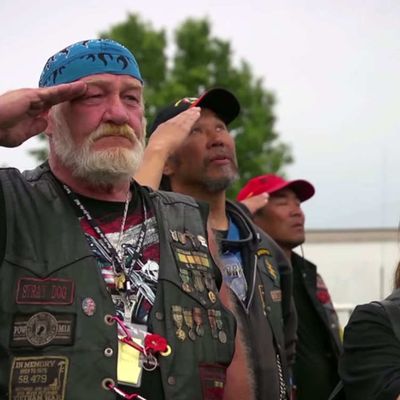
Debra GranikÔÇÖs Stray Dog enters the life of one man who could easily become a caricature and gives us a portrait novelistic in its depth and breathtaking in its humanity. On the surface, Ron Hall, the subject of GranikÔÇÖs documentary Stray Dog, is a kind of cultural Rorschach test: Depending on which part of the country you come from, and your own background, you might see him and arrive at any number of assumptions. HereÔÇÖs a gruff, heavy Vietnam vet and biker, leathered up and covered in tattoos, living in a trailer park in the Ozarks. Are you intimidated? Attracted? Curious? Terrified?
Granik met Hall when he came on to play a small part in her gripping 2011 drama WinterÔÇÖs Bone, an indie hit that gave Jennifer Lawrence her breakout role and scored an unlikely Best Picture Oscar nomination (exhibit A in why it was a good idea to expand the number of nominations in that category). The film, set and shot in the Ozarks, was a thriller of sorts, but what made it so special was its depiction of the tribal rituals of its setting; Granik had peopled her cast with many locals from the area. Ron Hall was himself one of those locals, and Granik set out to follow him with a camera, drawn to some of his evident contradictions. A Vietnam vet still haunted by the war (heÔÇÖs had to deal with post-traumatic stress for much of his life), Ron is a soft-spoken tough guy, reflective about the past, generous with his time, exceedingly selfless and articulate and curious. HeÔÇÖs a loner with a community: We always see him around people, but thereÔÇÖs always a sense of something unsaid, as if heÔÇÖs holding something back.
HeÔÇÖs also a man in love, it turns out. Much of Stray Dog involves RonÔÇÖs courtship of and marriage to Alicia, a Mexican immigrant, and their eventual efforts to bring her two sons over to the U.S. The interactions with Alicia and her family force Ron into an interesting position: In order to introduce them to America, he has to articulate his feelings about the place. And what comes out is stark, realistic, and very, very sad ÔÇö especially coming from a man who literally killed and bled for his country.
The knifeÔÇÖs-edge balance between loyalty and regret runs throughout Stray Dog. Ron is dedicated to his fellow vets, joining them as they ride to funerals and memorials; they also come to the aid of families who continue to struggle with loss. We see Ron visiting with one woman whose son died in combat some years ago. Seeing that the floor under her fridge is falling apart, he and his pals set out to repair it, evidently free of charge. The brotherhood of combat extends beyond the mere reality of the battlefield, beyond even specific wars. ThatÔÇÖs partly because thereÔÇÖs another undercurrent here, a growing awareness that veterans are also just as often united in poverty. Wars, he says at one point, are started by people with money and fought by people without money. ItÔÇÖs a casual observation but, when you realize how much this man has given of himself, an unbearably painful one.
ThatÔÇÖs not a new revelation, of course. Indeed, very few things in Stray Dog could be said to be ÔÇ£revelationsÔÇØ of any sort. But weÔÇÖve rarely seen this kind of desperation portrayed so vividly. The film is so immersive and intimate, so thoroughly engaged with RonÔÇÖs life, that we start to share his anger and sadness and concern. As AliciaÔÇÖs sons try to acclimate to life in the U.S. and to life with Ron, we can feel their anxiety. This isnÔÇÖt the land of opportunity that theyÔÇÖve come to. ItÔÇÖs a land of poverty, and quiet desperation. And somehow, gradually, this intimate documentary portrait of one very unique person starts to take on the qualities of a national epic. Through the eyes of this man, we start to see our own country in a different light. Happy Independence Day.


